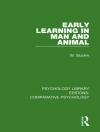Video Interaction Guidance (VIG) is an effective intervention which builds positive relationships through filming and feedback sessions. By micro-analysing actions and communications in this way, clients are supported to resolve their current difficulties and increase their sensitivity and attunement within the relationship.
Bringing together contributions from researchers and practitioners across a range of professions, this book provides a definitive introduction to VIG. The book explains the theory behind the approach, reviews research evidence, and offers case studies that document how VIG has been successfully applied to family relationships, schools and higher education, individuals with communication and developmental disorders, and as a reflective professional development tool. The approach is then discussed from a range of theoretical perspectives and within the contexts of narrative therapy, infant and attachment interventions, positive psychology and mindfulness.
This authoritative and comprehensive guide to VIG will be an important text for psychologists, psychiatrists, counsellors, social workers, therapists, and mental health and education professionals, as well as students and academics in these fields.
Spis treści
Preface. Hilary Kennedy, Educational Psychologist and Co-founder of the VEROC Centre, University of Dundee, UK. Part 1. Video Interaction Guidance. 1.What is Video Interaction Guidance (VIG)? Hilary Kennedy. 2. VIG and the Supervision Process. Kateøina Šilhánová, SPIN, Czech Republic and Michelle Sancho, Senior Educational Psychologist, West Berkshire Council and Honorary Lecturer, University College London, UK. 3. How and Why Does VIG Work? Jenny Cross, Freelance Educational Psychologist, VIG Supervisor and Coach, UK and Hilary Kennedy. 4. What is the Evidence that VIG is Effective? Ruben Fukkink, Researcher, University of Amsterdam, The Netherlands, Hilary Kennedy and Liz Todd, Professor of Educational Inclusion, Newcastle University, UK. Part 2. Applications of VIG. 5. VIG as a Method to Promote Sensitive Parent-Child Interaction in Infancy. Mariska Klein Velderman, TNO (Netherlands Organisation for Applied Scientific Research) Quality of Life, The Netherlands. 6. Supporting Vulnerable Families to Change through VIG. Maria V. Doria, Post-doctoral Researcher, University of Lisbon, Portugal and Honorary Research Fellow, University of East Anglia, UK, Calum Strathie, VIGuk Supervisor, UK and Sandra Strathie, VIGuk Supervisor and Social Worker, UK. 7. Use of VIG in Schools. David Gavine, formerly Principal Educational Psychologist, Dundee City Council, UK and Penny Forsyth, Senior Educational Psychologist, Dundee City Council and Co-founder of the VEROC Centre, University of Dundee, UK. 8. VIG when Working with Children and Adults on the Autistic Continuum. Penny Forsyth and Heather Sked, Educational Psychologist, The Highland Council, UK. 9. How VIG can Develop Partnerships with Parents/Educators in the Context of Childhood Hearing Impairment. Deborah James, National Institute of Health Research, Biomedical Research Unit in Hearing, Nottingham University, UK. 10. Video Enhanced Reflective Practice. Sandra Strathie, Calum Strathie and Hilary Kennedy. 11. Enhancing Teacher and Student Interactions in Higher Education through Video-Enhanced Reflection on Practice. Ruth Cave, Lecturer, University of Dundee, UK, Angela Roger, Senior Lecturer, University of Dundee, UK, and Richard Young, Professional Development Manager, Newcastle University, UK. Part 3. Connections. 12. Confirming Companionship in Interests, Intentions and Emotions: How VIG Works. Colwyn Trevarthen, Department of Psychology, University of Edinburgh, UK. 13. VIG and Attachment: Theory, Practice and Research. Jenny Jarvis, Chartered Counselling Psychologist and VIG Supervisor, South Lowestoft Children’s Centres, UK and Nelleke Polderman, Founder and Director of Basic Trust, The Netherlands. 14. Video Feedforward: Towards a Preferred Future. Miriam Landor, Educational Psychologist, West Lothian Council and Lecturer, University of Dundee, UK and Calum Strathie. 15. Reflecting on VIG Practice from a Relational Systemic Perspective. Carole S. Chasle, Senior Educational Psychologist, Derbyshire County Council, UK. 16. Narrative Therapy and VIG: Windows into Preferred Identities. Denise Mc Cartan, Stockton-on-Tees Educational Psychology Service, UK and Liz Todd. 17. Mindfulness, Attunement and VIG: Being Fully Present while Communicating. Henk Vermeulen, Mental Health Psychologist, Max Ernst GGZ, The Netherlands, Jacqueline Bristow, Chartered Educational Psychologist, UK, and Miriam Landor. 18. Beyond Therapy: Supporting a Culture of Relational Democracy. Wilma Barrow, Newcastle University and Scottish Borders Council, UK and Liz Todd. Glossary. References. The Contributors.
O autorze
Colwyn Trevarthen is Emeritus Professor of Child Psychology and Psychobiology at the University of Edinburgh.












